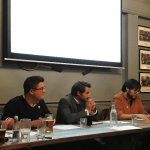This week, we focus on the role of open access in climate and marine science and on some initiatives that are empowering researchers and building open access platforms in this area. We also learn about the role of open access in helping achieve the UN Sustainable Development Goals and the importance of patient involvement in research. Finally, we consider how open access research may be misused to politicize scientific discourse and spread misinformation.
To read:
Open access to research on climate science and biodiversity via Creative Commons | 6-minute read
The Open Society Foundations revealed this week at the UN Climate Change Conference (COP26) that they have approved funding to lead a global campaign promoting open access to climate and biodiversity research. Their hope is that this strategy will encourage governments, foundations, universities and environmental organizations to work together to accelerate progress in solving the climate crisis and preserving global biodiversity.
Open access at NIHR via NIHR | 4-minute read
The National Institute for Health Research (NIHR) announced their new Open Access Policy this week. It will require all NIHR-funded research articles to be made open access under an open licence immediately upon publication. The policy is in line with the UK government’s commitment to open access.
Patient involvement in research via The Publication Plan | 5-minute read
A survey of over 100 editors-in-chief of medical journals found that most of them support patients being co-authors on manuscripts and that many believe patient contributions are critical to both quality and equality in biomedical research. The authors of the article advocate that more policies are needed to support ethical patient authorship and encourage greater patient participation.
Fears about misinformation and the politicization of science via The Scholarly Kitchen | 10-minute read
Although open access has democratized science, some are concerned over the unintended negative consequences associated with easier access to scientific literature. Roger Schonfeld, Director of Libraries, Scholarly Communication and Museums for Ithaka S+R, recently wrote about how open access has made it easier for scientific literature to be quoted and used in political discourse and to be misused to misinform the public and intentionally cause disunity.
To listen to:
Open access and a sustainable blue economy via YouTube | 4-minute video
This video from Blue-Cloud focuses on their efforts to empower researchers to access and use open data and analytics in marine science. They highlight the importance of open science for fostering collaboration between multiple sectors, supporting evidence-based decision-making and ultimately protecting marine ecosystems. You can learn more about Blue-Cloud by reading their most recent blog post.
Open access and the UN Sustainable Development Goals via YouTube | 55-minute video
This webinar from Open Access Australasia, hosted by the University of New South Wales (UNSW) and presented by Dr Fiona Bradley, Director of Research Services and Corporate at UNSW, focuses on the contribution of open access to the United Nations (UN) Sustainable Development Goals.
To engage with:
FORCE2021 Conference on the future of research communications via FORCE11
The Future of Research Communications and e-Scholarship (FORCE11) are holding their annual conference (FORCE2021) between 7 and 9 December 2021. The title of the conference is ‘Joining Forces to Advance the Future of Research Communications’. The conference plans to bring together many stakeholders for an open discussion about the changing ways scholarly and scientific information are communicated, shared and used. You can register here.
The cOAlition S Rights Retention Strategy in practice via Leeds University Library and Eventbrite
On 24 November 2021, Leeds University Library are hosting a virtual talk with cOAlition S on the cOAlition S Rights Retention Strategy (RRS). They will discuss the RRS and how to use it, and how some commercial publishers are seeking to undermine the initiative. On 16 December 2021, Leeds University Library will also host the Open Library of Humanities to discuss sustainable open access, which you can register for here.
Have you read our recommendations for plain language summaries of peer-reviewed medical journal publications? Find out more here and join the discussion on social media using the hashtag #PlainLanguageSummaries.






